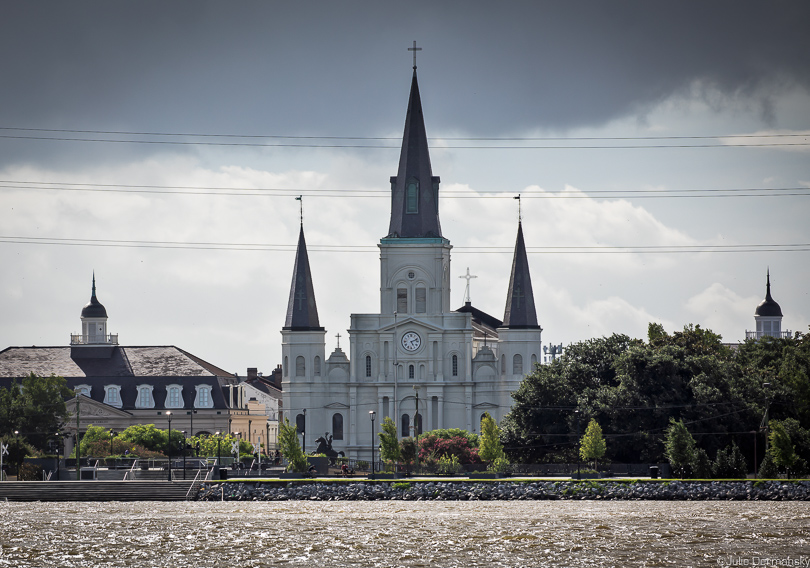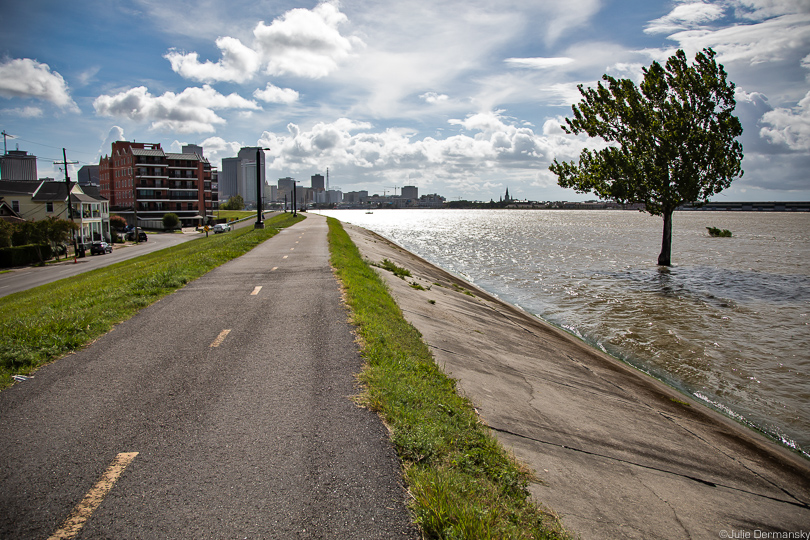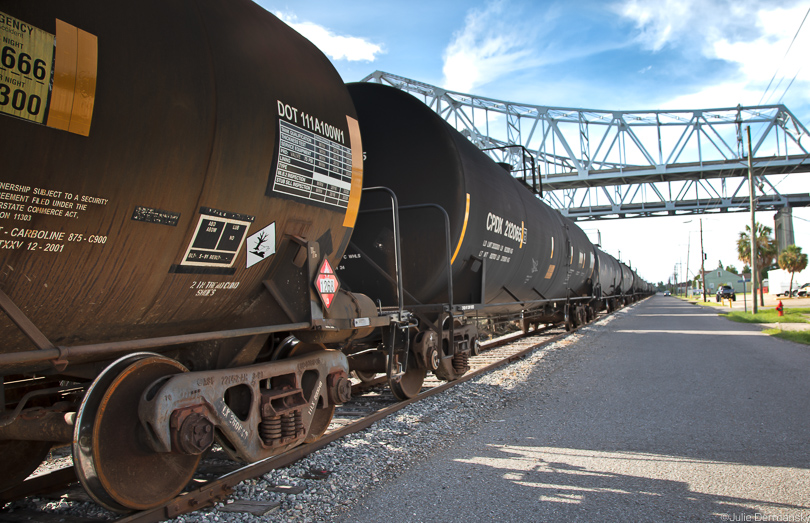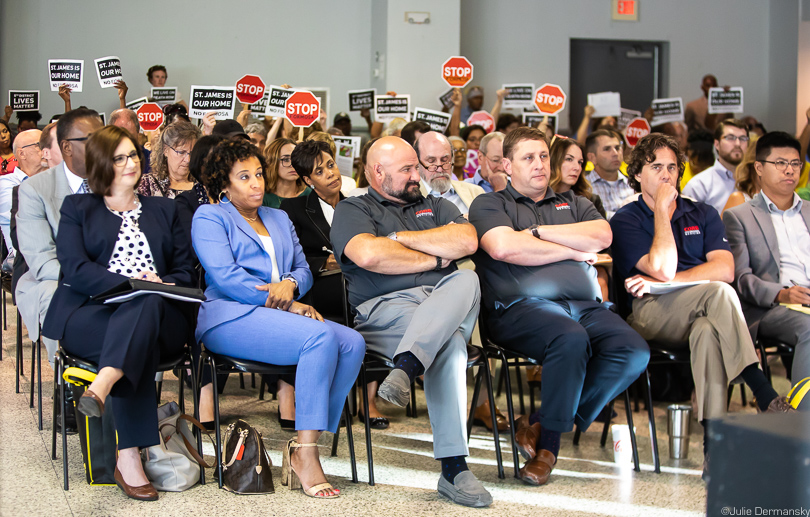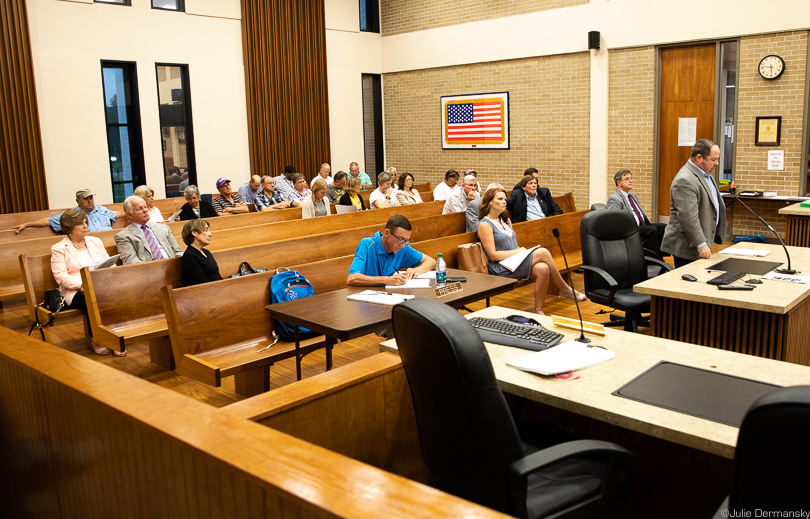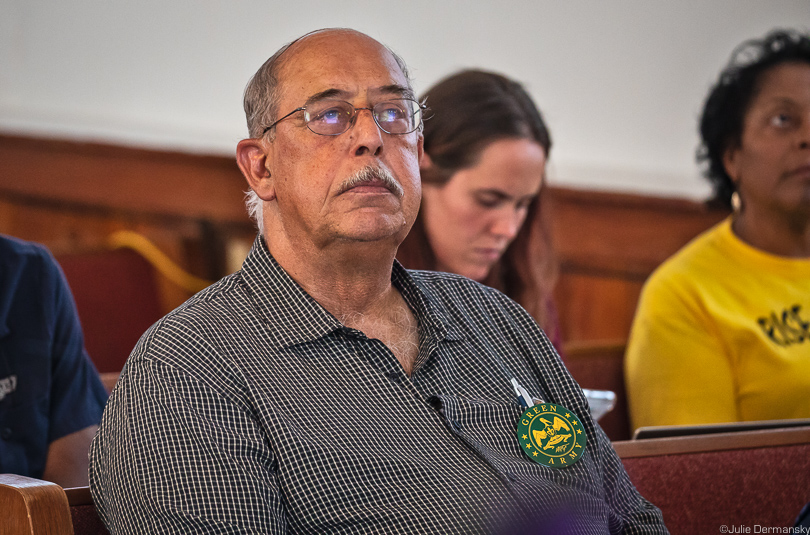Yesterday, I stopped writing another story for DeSmog to get ready for what could likely become this year’s first hurricane in the U.S.
I live in Mandeville, Louisiana, on the north shore of Lake Pontchartrain across from New Orleans. My home is above sea level, unlike much of New Orleans, so I’m at a much lower risk for flooding impacts than residents of a city nearly synonymous with flooding.
However, like most residents in south coastal Louisiana, I’m bracing myself for a sustained barrage from the sky, as bands of rain and wind from Tropical Storm Barry arrived in parts of the state this morning. The entire Louisiana coast could be hit with the season’s first hurricane by Saturday.
Hurricane or not, the storm is forecast to drop more than a foot-and-a-half of rain on parts of the state as it moves inland.
A National Oceanic and Atmospheric Administration (NOAA) warning issued this morning states: “There is danger of a life-threatening storm surge inundation along the coast of southern and southeastern LA, where a storm surge warning is in effect. The slow movement of Barry will result in a long duration of heavy rainfall and flood threat along the central Gulf Coast and inland through the lower Mississippi Valley through the weekend and early into next week.”
New Orleans near Algiers Point Thursday, July 11, 2019. The Mississippi River, a little too close to the top of the levee for comfort, as Tropical Storm Barry approaches Louisiana’s coast.
And a report issued by NOAA just a couple days earlier now serves as an ominous warning about what is to come in a climate-changed future. “Annual flood records are expected to be broken again next year and for years and decades to come from RSL [relative sea level] rise,” it reads. “Projecting out to 2030 and 2050 provides vital information for communities that are already taking adaptation steps to address coastal flooding impacts and those that are beginning to assess future flood risk in their communities.”
“We need a new model to base storms warnings on,” Lt. General Russel Honoré, founder of the Green Army, told me on a call on Thursday night. He worries that people are still used to basing their evacuation plans on a hurricane’s predicated category number, which is based on wind strength, and not factoring in a storm’s flood potential. “We have seen with Harvey and other recent storms that even no-name storms can be life threatening.
“Climate change impacts aren’t factored into storm danger warnings, like the increased potential of storm surges due to sea level rise, and the weakening of natural defense of natural storm protection due to the erosion of the marshes,” he said, so relying on a hurricane’s wind strength is both dangerous and foolish.
Honoré blames politicians and the media for not informing the public that we are already in a climate crisis. “It is a crying damn shame that politicians are muffling the warnings of scientists,” he said. “We need a World War II-like effort to combat the climate crisis, but instead we are moving in the opposite direction. The government is not only permitting more polluting facilities that contribute to global warming to be built, it is subsidizing them, too.”
Trains parked under the Crescent City Connection before Barry hits in an area that is below sea level, though protected by the levee
Though both Governor John Bel Edwards and President Donald Trump declared a state of emergency in Louisiana as it braces for Barry’s landfall this weekend, neither acknowledge the conclusions of mainstream climate science.
Earlier this week The Washington Post reported that Trump White House officials barred a State Department intelligence agency from submitting written testimony to the House Intelligence Committee warning that human-caused climate change is “possibly catastrophic.” This came after State Department officials refused to edit out references to federal scientific findings on climate change.
Honoré, most famous for taking control in New Orleans in Hurricane Katrina’s aftermath, has been busy since 2012 trying to find a solution to pollution and advising on disaster readiness. “Al Gore started warning us about the impacts of global warming over a decade ago, and we didn’t heed the warning,” Honoré said, himself included — but he is now.
The need to prevent the worst impacts from climate change is one of the reasons that he has come out against building new petrochemical plants along the 80-mile stretch of the Mississippi River known as Louisiana’s Cancer Alley, where more than 100 petrochemical plants and refineries currently stand.
Honoré sees the building of more fossil fuel-powered factories along the river as a precursor to a Chernobyl-like situation. In doing so, “we are allowing a vicious cycle of reckless corporate drives to speed up global warming.”
“Louisiana politicians and the Trump administration’s ongoing denial of climate science won’t change the climate crisis that we are already facing,” Honoré said. “The future we feared is here.”
On July 9, Honoré was one of more than 100 people who attended a public hearing held by the Louisiana Department of Environmental Quality concerning 15 air quality permits for a proposed Taiwanese-owned industrial complex called the Sunshine Project.
LDEQ’s permit hearing for Formosa’s air quality permits on July 9.
If approved, Formosa, the project’s owner, will be one step closer to starting construction on its $9.4 billion plastics manufacturing complex in northern St. James Parish on the bank of the Mississippi River.
The project would allow for millions of tons of greenhouse gases and hundreds to thousands of tons of pollutants, like fine particulates and sulfur and nitrogen oxides, that can cause human health problems. In the mix of toxic emissions will be benzene and ethylene oxide, two cancer-causing agents that will be worsening the area’s already polluted air.
The following night Honoré planned to attend a St. James Parish Council meeting about an appeal for a proposed Chinese-owned Wanhua chemical plant, but he didn’t make it due to the weather.
St. James Parish Council meeting on July 10.
However, I was at the hearing, as were a handful of others, including opponents of the plant who are part of the appeal, which the parish council has to hear before letting the permit it granted for the project stand. Getting to the meeting was a risky venture. I had to steer clear of downed trees and hold on tight while my car was pushed around by high winds while I drove through a torrential downpour that greatly limited visibility.
“Holding the meeting while people are preparing for the coming storm, as rain bands are coming in, is a total disconnect from reality,” Honoré said. “Holding the meeting under those circumstances is the ultimate for being stuck on stupid,” he added. Though the meeting went on as planned, Lisa Jordan, director of Tulane’s Environmental Law Clinic, which represents the chemical plant’s opponents, was able to get a continuance, set for July 24, after asking for an extension to make her remarks. She explained that because she only received documents she requested a few days ago, she needed more time for the appeal.
Lt. General Russel Honoré, founder of the Green Army, at a community meeting about Mosaic’s fertilizer plant.
Honeré is also tracking a dangerous situation at Mosaic’s Uncle Sam fertilizer plant in St. James Parish, which is located next to the site where the Wanhua plant will be built if approved. Last month Mosaic met to discuss efforts to prevent a potential environmental catastrophe in the heart of Cancer Alley: a collapse of a nearly 200-foot-tall wall of mineral waste and the subsequent release of acidic wastewater into nearby waterways and wetlands.
He fears that the company could use Tropical Storm Barry as an excuse to start an emergency option scenario of dumping that wastewater into the Mississippi River. State regulators have downplayed the health risk to those who get their water from the river should that scenario play out, but even if potential wastewater gets released into the river and quickly dissipates, it has both radioactive and carcinogenic substances in it.
Will this storm’s impact on Cancer Alley help decide the outcome for the proposed plastic and chemical plants? While impossible to predict, these days living in southern Louisiana increasingly feels like playing a game of Russian Roulette.
*7/15/19: This story has been updated to correct the spelling of the St. Louis Cathedral in New Orleans.
Main image: Storm clouds over the St. Louis* Cathedral in New Orleans’ French Quarter on July 11. Credit: All photos by Julie Dermansky for DeSmog
Subscribe to our newsletter
Stay up to date with DeSmog news and alerts


